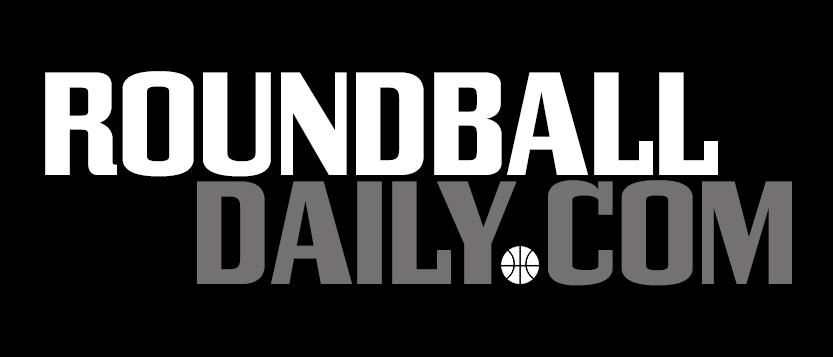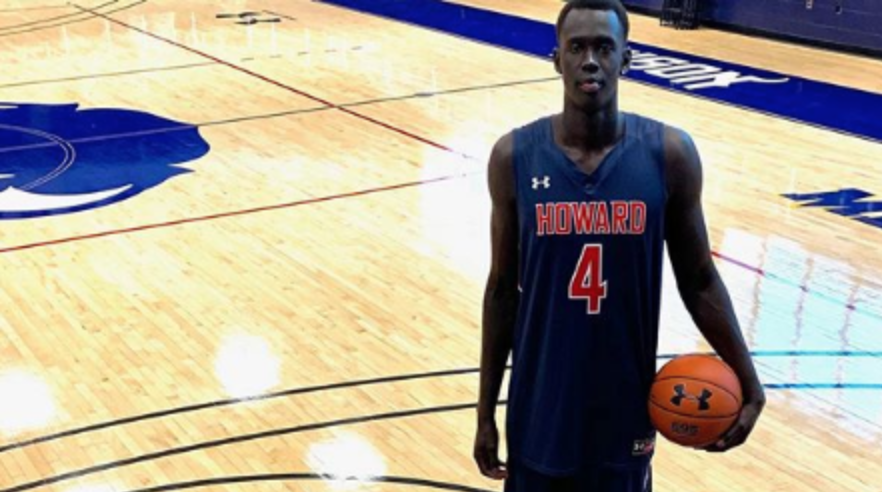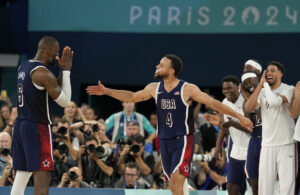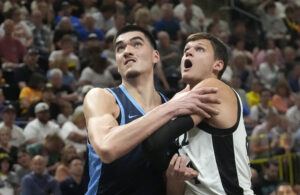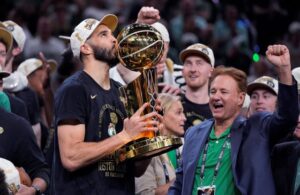- Paris Olympics takeaways: What did Team USA’s crunch-time lineup say about NBA’s hierarchy?Posted 2 months ago
- Zach Edey posted an easy double-double in Summer League debut. Here’s why he’ll succeed in NBAPosted 3 months ago
- What will we most remember these champion Boston Celtics for?Posted 4 months ago
- After long, seven-year road filled with excruciating losses, Celtics’ coast to NBA title felt ‘surreal’Posted 4 months ago
- South Florida men’s basketball is on an unbelievable heater– but also still on the bubblePosted 8 months ago
- Kobe Bufkin is balling out for Atlanta Hawks’ G League team. When will he be called up to NBA?Posted 9 months ago
- Former Knicks guards Immanuel Quickley, RJ Barrett may yet prove Raptors won the OG Anunoby tradePosted 10 months ago
- Rebounding savant Oscar Tshiebwe finally gets NBA chance he’s deserved for yearsPosted 10 months ago
- Is Tyrese Maxey vs. Tyrese Haliburton the next great NBA guard rivalry?Posted 11 months ago
- The Detroit Pistons are going to be a problem in a few yearsPosted 12 months ago
Here’s hoping Makur Maker’s choice to attend HBCU Howard becomes a trend
- Updated: July 6, 2020
By: Kels Dayton
Earlier this week, one of the best high school prospects in the country shunned Duke, Kentucky and UCLA for Howard University.
He couldn’t have chosen a better school.
Makur Maker, a 6-11 forward with guard skills, crazy athleticism and a feathery touch from the outside, is ranked as the No. 16 prospect in ESPN’s Top 100. He’s the highest-rated recruit to choose an historically black college or university since ESPN began ranking high school players.
The five-star recruit was born in Kenya to South Sudanese parents and grew up in Australia before moving to North America to play high school ball. Makur is the cousin of Detroit Pistons forward Thon Maker, who was taken with the 10th overall pick in the 2016 NBA Draft.
It’s hard to overstate the boldness of Makur’s decision– to shun some of the best programs in America in order to lend real-life support to the mission of an HBCU school like Howard.
He’s passing on the well-proven track records of coaches like Mike Krzyzewski, John Calipari and Mick Cronin (OK, that one actually makes sense), and the competition of a major conference– not to mention the fellow five-star recruits he’d face every day in practice– to play against the likes of Delaware State, Bethune-Cookman, Coppin State and Florida A&M. It’s a truly remarkable decision, and one that could, in all practicality, stunt his growth as a basketball player.
But Maker isn’t worried about that.
“I need to make the HBCU movement real so that others will follow,” he wrote on Twitter, adding that he hopes to inspire players like Mikey Williams, ESPN’s No. 3 overall prospect in the Class of 2023, to join him in choosing an HBCU school.
“There’s a lot of business opportunities, a lot of Black leaders here,” Maker said during his visit. “I’ve seen the alumni. I spoke to the president. The opportunity is here.”

Makur Maker could become the first player from an HBCU school to be taken in the NBA Draft since 2012.
Maker said the camaraderie and togetherness of the HBCU culture is one of the reasons why he wanted to go to school at Howard. The university, which is located in D.C., has sent a grand total of two players to the NBA in its history. Joe Cooper and Larry Spriggs both made the leap in 1981.
“It seems like everybody is all in together, everybody knows each other,” Maker said. “The culture is definitely here. I’ve never seen anything like it.”
His guardian, Ed Smith, agreed, telling ESPN:
“Kids could say, ‘I would feel welcome that I’m not just an athlete — I’m part of a community. On the visit at Howard, that was the main difference. Just for me on the outside looking in, he’s part of the fabric. You’re not just the athlete or the Black athlete.”
Second-year head coach Kenny Blakeney, who served as an assistant under Coach K and played on Duke’s 1991 and ’92 national championship teams, said he’s “beyond excited” for Maker to join his squad. The exhilaration may be dampened by the fact that next year’s college basketball season is anything but certain, and Maker may well end up being a one-and-done player, but none of that matters right now.
For HBCUs like Howard, which often spend most of their non-conference seasons playing on the road in an effort to pick up enough checks to keep their programs running, this is a game-changing coup.
Their seasons begin with endless “guarantee games,” and if their dreams are realized, end with a 15 or 16 seed in the NCAA Tournament. It’s a different world than playing at Duke or Kentucky.
Howard played six of its first seven games on the road last season, and started the year 0-9 before entering conference play. MEAC champion North Carolina Central played eight of its first ten on the road, and started the year 2-10 before rebounding to finish 18-13.
Of course, Howard had plenty of problems that extended beyond never-ending season-christening road trips. The Bison finished the year with a 4-29 record, and went 1-15 in the MEAC. Now, they’ve got one of the nation’s top recruits. It’s remarkable.
Maker’s statement, which radiates empowerment, courage and character, will be remembered. His effort to try and tilt the scale a little bit more towards racial equality in this country, even if just through his own talent as an amateur basketball player, is inspiring. He’s demonstrating the value of an HBCU education by backing it with his NBA-level talent, like gold backing currency. In this case, though, the currency was already valuable– now it’s just being lent some more star power.
It’s been eight years since an HBCU player was selected in the NBA Draft (Norfolk State’s Kyle O’Quinn). It’s been decades since players routinely came from historically black schools (Earl Monroe, Sam Jones, Charles Oakley, Willis Reed, Ben Wallace and Rick Mahorn are some of the best to ever do it). Makur Maker will be the next to join that list, and there are so many who will be beaming with pride when he does it.
This decision couldn’t have been easy, and there will be plenty who criticize it, whether they put their name to it publicly or not.
But by making the road harder for himself, Makur Maker has made it easier for others to follow in his path.
That’s the definition of character.
That, like much of what we’ve seen around the world since the unspeakable death of George Floyd on the streets of Minneapolis, matters.
Also see:
Maya Moore can now celebrate perhaps her greatest victory, and not with UConn or the Minnesota Lynx
